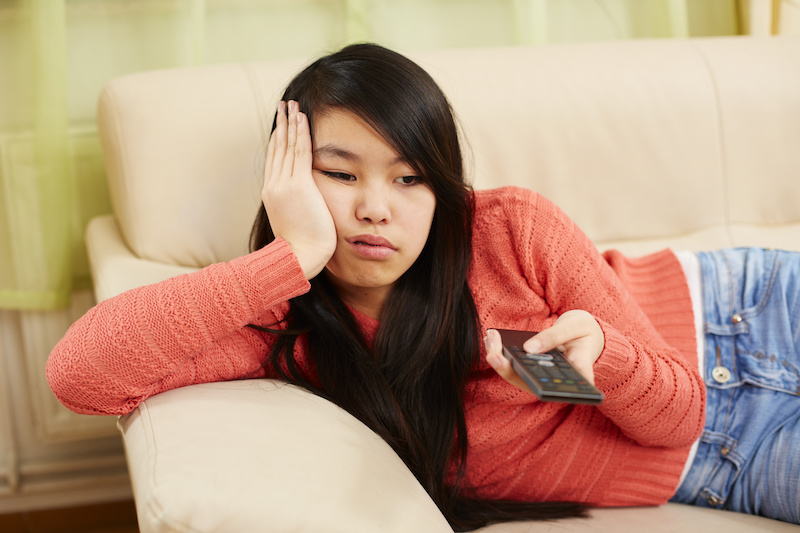Teens, social distancing, and anxiety in the time of COVID-19

You’d think teens would be in their sweet spot: minimal school, no extracurriculars, and plenty of time to sleep in, watch Netflix, surf the web, and have video chats. But in reality, many teens are unnerved by COVID-19 and the disruption it has brought. Many struggle with being stuck at home, unable to visit their friends, and are increasingly concerned.
“Humans, no matter how dependent they are on technology, need authentic social interaction,” says Martine, 16, my own teen who believes she speaks for many kids she knows. “Even people like me, who are on the introverted side, feel the effects of it.”
While online classes are starting to take shape, many teens are struggling with the lack of a daily routine. “That structure is important to us — it’s more costly to let go of that than internet time,” Martine says. “Some people are sleeping the whole day because they don’t know what to do with themselves.”
Then there are the cancelled events, including graduations. “These are events that people have been looking forward to, and to see those being shattered is unnerving.”
And despite Gen Z snark and absurdist humor, the COVID-19 pandemic and constant social media chatter about it are causing genuine anxiety. “It’s easy to get paranoid and go into a thought spiral, like ‘oh, no, what could happen?’ The uncertainty and prospect of things going really, really downhill scares people.”
I reached out to psychologist Carolyn Snell, PhD, of the Medical Coping Clinic at Boston Children’s Hospital, for her thoughts on helping teens manage.
Why are teens having such a hard time social distancing, if they’re always on their devices anyway?
One thing these times may be teaching us is that we and our teens have been undervaluing how important face-to-face interactions are. From the perspective of our brains and emotions, there’s no digital equivalent to just hanging out. That said, teens can benefit greatly from staying in virtual touch with their friends or having safe in-person interactions that maintain social distancing, like a bike ride with a friend.
What are you hearing from teens who have a chronic medical condition?
Our medical teams, including mental health clinicians, are trying to proactively support our teens with chronic medical conditions. Many are at higher risk because of lung disease or immunosuppression and are understandably experiencing more anxiety. We remind them that, compared to the rest of us, they’re more used to doing things like infection control every day, and they may have more experience coping with social isolation if they have had to spend time in the hospital.
How can I help my teen cope?
If I could offer a “prescription” for teens to stay emotionally well in the coming weeks it would be:
- Create a schedule and structure for your days: Maintaining a routine is important to mental health and well-being. Have an activities list you can turn to when bored, with a mix of categories: physical, social, hobbies, relaxation, etc.
- Establish a regular sleep and wake time. I have seen kids and teens quickly become nocturnal without the structure of school. It’s also really peaceful at night, and I think a lot of kids are seeking that calm. But a regular nighttime sleep schedule is very beneficial in managing anxiety, stress, mood, and concentration.
- Build in exercise and, if you can do so safely, get outdoors. Fresh air and being in nature are excellent stress relief. Take a walk, run or take a bike ride.
- Use what works for you. If you find yourself having worried thoughts, focus on what you can do and what has worked in the past in stressful situations. Some people cope by getting lots of information; others might prefer relaxing activities or seeking social support.
- Limit media consumption. While we all want to be informed, there’s a saturation point beyond which where more information may lead to increased worry but not increased preparedness. An hour a day of news might be a good limit to set.
Boston Children’s response to COVID-19
Related Posts :
-

The hidden burden of solitude: How social withdrawal influences the adolescent brain
Adolescence is a period of social reorientation: a shift from a world centered on parents and family to one shaped ...
-

Help your child manage anxiety about school violence
With news of school shootings and other violence often reaching children, parents sometimes grapple with how to help their child ...
-

A better treatment for endometriosis could lie in migraine medications
Endometriosis is a common, mysterious, often painful condition in which tissue similar to the uterine lining grows outside the uterus, ...
-

Model enables study of age-specific responses to COVID mRNA vaccines in a dish
mRNA vaccines clearly saved lives during the COVID-19 pandemic, but several studies suggest that older people had a somewhat reduced ...





